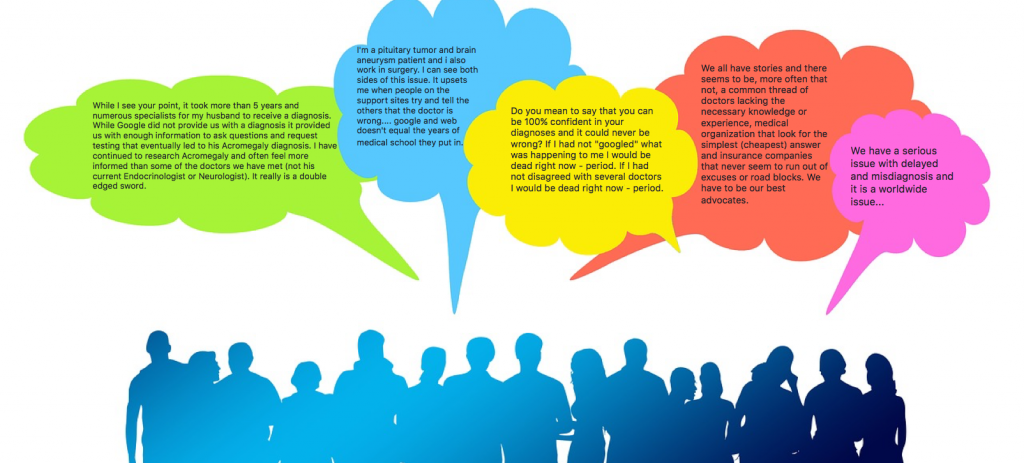From Jorge D. Faccinetti – cofounder – Someone once noted that if you go to the internet to diagnose yourself, you will come away thinking that you have a life expectancy of three or four minutes.
There is a lot of truth in that statement. We are inundated with misinformation and fake news or, best case scenario, not the whole picture. In other words, some of the information is factual and some, unfortunately a big part of it, made up to serve other purposes that have nothing to do with fact and science.
If you frequent our Facebook feed you would have noticed a recent post from Pituitary World News co-founder Dr. Lewis Blevins in which patients and doctor opined on the Internet as responsible for the evil and savior of all things. Dr. Blevins aptly commented that “that a doctor who diagnoses and treats himself has a fool for a doctor and a fool for a patient.”
He wrote:
“In this day and age of Google, one must say the same thing about patients who self-diagnose and insist they have diseases they truly don’t. Sadly, there are doctors out there who, for unclear reasons, buy into it, and treat creating havoc. Yes…it’s been one of those days! The role of a specialist is not only to diagnose and treat, but also to refute diagnoses and proclaim treatment as unneeded when necessary.”
That post in our Facebook feed unleashed a fury of comments from readers. Many of the comments made excellent, valid, and thoughtful points. A few self-serving comments sounded more like grandstanding, as it was in the case of a person who commented Dr. Blevins post seemed “incredibly preachy and shaming for a page purporting to provide pituitary news”, a bit of a cheap shot, I thought.
All grandstanding aside, though, I must admit Dr. Blevins’ comments seem a bit unwieldy at first pass. Then I thought, wait a minute; this is exactly why we do what we do. Discussion and debate educate and generates awareness, and awareness is the first critical step to solving any problem. When the problem is the time that it takes for pituitary patients to receive a proper diagnosis because these diseases are not on the radar, awareness is a huge big step in solving this critical issue. The longer it takes to diagnose, the tougher to cure and treat, and the more related problems it generates for people who suffer pituitary disease.
The way to reduce the time to proper diagnosis is to make people, all people, including patients, doctors, and health care workers of all flavors and colors aware so 1) patients know to ask the right questions and 2) physicians have it on their radar and put it on their list of possibilities.
It could not be simpler and more basic: awareness leads to interest, which leads to engagement, which leads to better-informed people. A higher number of informed people will undoubtedly lead to lower rates of misdiagnosed and undiagnosed. A big part of increasing awareness comes with this type of involvement from you, the community, so information is shared and people, who probably have never heard of a pituitary disease, or the pituitary gland for that matter, will know what it is and what can happen when it malfunctions.
What is clear to this reporter, as Dan Rather would say, is that Dr. Blevins comments generated a rich discussion with differing, highly personal points of view. Anyone who reads any of these comments will get a hell of an education of what it is like to have a pituitary disease like acromegaly, Cushing’s or adrenal insufficiency, to name a few.
Regardless of whether you agree or disagree with the finer points of this discussion, we see it as our duty to share our point of view and report on scientifically based facts. In this case, a growing number of misdiagnosed patients who believe they have a condition and who are prescribed very dangerous, harmful medications, which can potential cause severe damage to a patient that did not have a particular disease.
As many of you pointed out in the comments, most pituitary patients, myself included, take a very long time (almost 28 years) to get properly diagnosed. I wrote about my personal experience with acromegaly and about why Dr. Blevins and I launched this news magazine.
So I say, yes. Go for it! Write, debate, and react to posts. Get out there, get pissed off and use this opportunity to spread the word. Use PWN and all the other reliable science based sources. Give them to your primary care docs, and anyone else you think should be involved in this effort. This document outlines some ideas to transform how information is spread and offers target audiences, programs, and activities.
Get in touch and we will help you get involved.
Click here to go to our Facebook page and read the comments.
If you want to read more about the person that said “if you go to the internet to diagnose yourself, you will come away thinking that you have a life expectancy of three or four minutes”, take a look at this article funny article.
© 2017 – 2022, Pituitary World News. All rights reserved.
